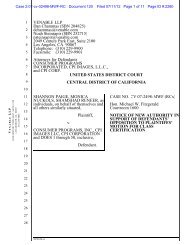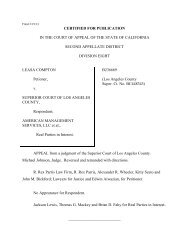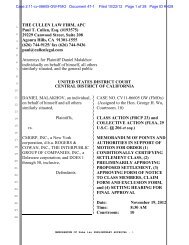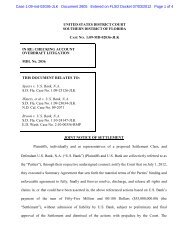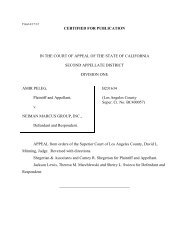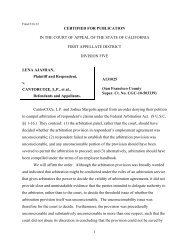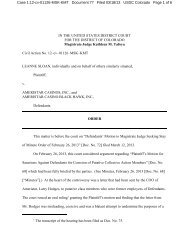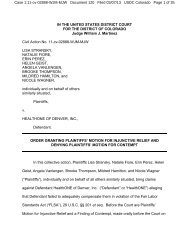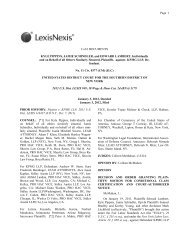order denying motion to decertify - Impact Litigation Journal
order denying motion to decertify - Impact Litigation Journal
order denying motion to decertify - Impact Litigation Journal
Create successful ePaper yourself
Turn your PDF publications into a flip-book with our unique Google optimized e-Paper software.
Case 3:05-cv-01018-GPC-WVG Document 394 Filed 02/14/13 Page 2 of 9<br />
1<br />
2<br />
3<br />
4<br />
5<br />
6<br />
7<br />
8<br />
9<br />
10<br />
11<br />
12<br />
13<br />
14<br />
15<br />
16<br />
17<br />
18<br />
19<br />
20<br />
21<br />
22<br />
23<br />
24<br />
25<br />
26<br />
27<br />
28<br />
falsely and deceptively represented they would receive a premium bonus, added <strong>to</strong> their investment<br />
account values, and that the inves<strong>to</strong>rs would not be charged any sales charges or fees. Plaintiffs claim<br />
that, in truth, the premium bonus was illusory because National Western would recoup the bonus, or<br />
a portion thereof, by crediting the annuities with less interest than if the annuities did not have a bonus.<br />
Plaintiffs additionally claim the annuities do impose a sales charge by way of sales commissions paid<br />
<strong>to</strong> agents. National Western claims Plaintiffs received a valuable product that is exactly what they<br />
were <strong>to</strong>ld it is, so they have not been damaged in any way.<br />
Prior <strong>to</strong> this case’s transfer <strong>to</strong> this Court, Judge Sammartino certified a national RICO class and<br />
a California class. (ECF No. 206.) In certifying the national class, Judge Sammartino concluded, for<br />
purposes of analyzing the predominance requirement under Rule 23(b)(3), that common questions of<br />
causation predominated over individual ones. With regard <strong>to</strong> causation, Judge Sammartino first noted<br />
that “Plaintiffs have established causation by showing reliance on the alleged misrepresentations.”<br />
Judge Sammartino stated: “Finding that reliance is a common question in this case is logical,”<br />
concluding “[c]onsumers are nearly certain <strong>to</strong> rely on prominent (and prominently marketed) features<br />
of a product which they purchase.” Then, citing the proposition that “by definition, parties <strong>to</strong> a<br />
contract are aware of and rely on the representations and omissions in the contract,” Judge Sammartino<br />
concluded such an inference could be made in this case on a class-wide basis even though the alleged<br />
misrepresentations were not actually part of that contract but were included in “written materials about<br />
the contract” that Plaintiffs were required <strong>to</strong> read and understand.<br />
In support of her conclusion, Judge Sammartino cited Negrete v. Allianz Life Insurance<br />
Company of North America (“Negrete I”), 238 F.R.D. 482, 491 (C.D. Cal. 2006), which provides that<br />
“evidence of standardized written presentations, coupled with plaintiffs’ allegations that class members<br />
purchased annuity products far less valuable than other comparable products or the prices paid for<br />
them, adequately establishes proximate causation.” Judge Sammartino also cited Garner v. Healy, 184<br />
F.R.D. 598 (N.D. Ill. 1999), and Peterson v. H & R. Block Tax Services, Inc., 174 F.R.D. 78 (N.D.<br />
Ill. 1997), which, according <strong>to</strong> Judge Sammartino, “held that classwide reliance was obvious where<br />
no other logical explanation would support the class members’ behavior.” Judge Sammartino lastly<br />
cited Poulos v. Caesars World, Inc., 379 F.3d 654, 664-66 (9th Cir.2004), for the proposition that<br />
2 3:05-cv-1018-GPC-WVG



